Living next door to Russia: How Moscow's war in Ukraine sparked a seismic shift in Finland
By David Mac Dougall • Updated: 10/03/2022
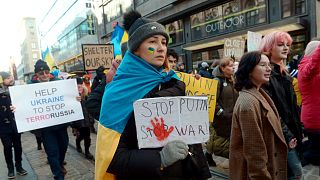
People hold banners and Ukrainian flags during a protest against the Russia invasion, in Helsinki, Saturday, March 5, 2022 - Copyright Credit: AP
"A Russian is a Russian" the old Finnish saying goes, "even if you fry him in butter."
While political leaders have warned against holding individual Russians responsible for Moscow's invasion of Ukraine, this one phrase -- that everything except Russians tastes better after being fried in butter -- sums up an ingrained wariness in the national psyche when it comes to attitudes about their huge eastern neighbour.
With a 1,300-kilometre shared border -- the longest in the European Union -- more than a hundred years as part of the Russian Empire, and two bloody wars in the 20th century (not to mention a couple of decades of Finlandisation, when the Kremlin had the final say on any major political decisions), the Finns like to think they know a thing or two about dealing with Russia.
Even the canny Finns, though, were caught by surprise at the speed of developments that unfolded since 24 February, when Russia invaded Ukraine.
In just two weeks there's already been a seismic shift for politics, business and society in the Nordic nation. And the question of an application to join NATO, long since put on the back burner of public debate, has become the number one subject of political discourse from Hanko in the south to Utsjoki in the north, and all points in between.
The issue is certainly getting a good airing - or to use another Finnish phrase, the cat has been put on the table.
"I think everything has changed in a few weeks. The European Union has changed a lot. And the discussion has changed totally. And it's understandable when people are very afraid," says Jussi Saramo, the deputy leader of Finland's Left Alliance party, one of the five which make up the government coalition.
In light of the Russian invasion, the Left Alliance will launch an internal debate with a view to overhauling and updating their foreign and security policies - perhaps even a shift to being more positive on NATO, something unthinkable this time last month.
That party, and the whole government, already crossed some invisible policy line when they approved the export of offensive weapons to Ukraine, to be used against Russia. The Finnish default of not poking the bear has been thoroughly cast aside.
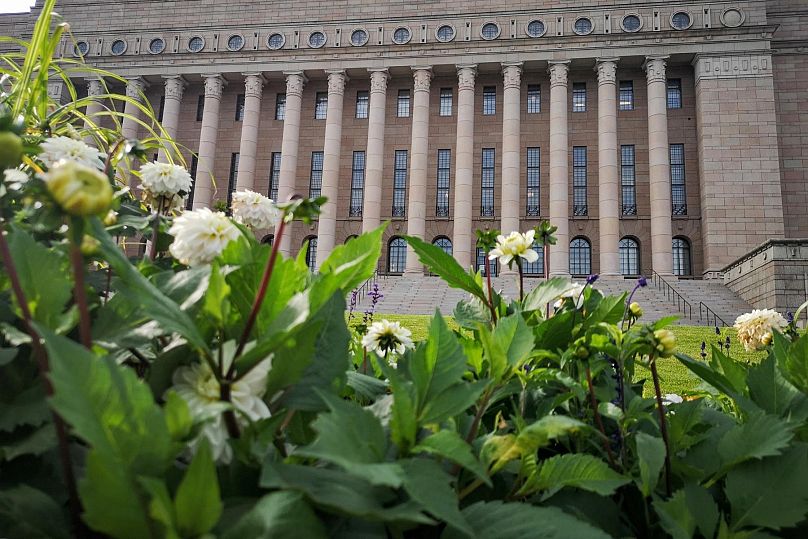
By David Mac Dougall • Updated: 10/03/2022

People hold banners and Ukrainian flags during a protest against the Russia invasion, in Helsinki, Saturday, March 5, 2022 - Copyright Credit: AP
"A Russian is a Russian" the old Finnish saying goes, "even if you fry him in butter."
While political leaders have warned against holding individual Russians responsible for Moscow's invasion of Ukraine, this one phrase -- that everything except Russians tastes better after being fried in butter -- sums up an ingrained wariness in the national psyche when it comes to attitudes about their huge eastern neighbour.
With a 1,300-kilometre shared border -- the longest in the European Union -- more than a hundred years as part of the Russian Empire, and two bloody wars in the 20th century (not to mention a couple of decades of Finlandisation, when the Kremlin had the final say on any major political decisions), the Finns like to think they know a thing or two about dealing with Russia.
Even the canny Finns, though, were caught by surprise at the speed of developments that unfolded since 24 February, when Russia invaded Ukraine.
In just two weeks there's already been a seismic shift for politics, business and society in the Nordic nation. And the question of an application to join NATO, long since put on the back burner of public debate, has become the number one subject of political discourse from Hanko in the south to Utsjoki in the north, and all points in between.
The issue is certainly getting a good airing - or to use another Finnish phrase, the cat has been put on the table.
"I think everything has changed in a few weeks. The European Union has changed a lot. And the discussion has changed totally. And it's understandable when people are very afraid," says Jussi Saramo, the deputy leader of Finland's Left Alliance party, one of the five which make up the government coalition.
In light of the Russian invasion, the Left Alliance will launch an internal debate with a view to overhauling and updating their foreign and security policies - perhaps even a shift to being more positive on NATO, something unthinkable this time last month.
That party, and the whole government, already crossed some invisible policy line when they approved the export of offensive weapons to Ukraine, to be used against Russia. The Finnish default of not poking the bear has been thoroughly cast aside.

File picture of the Finnish Parliament, Eduskunta, Helsinki
David Mac Dougall
Most politicians still wary on the NATO question
Finland's security policy timeline can be split into the period before the Russian invasion of Ukraine when only two parties in parliament were advocates of applying to join NATO; and after the invasion, with every Finnish political party now actively debating the question of becoming a member of the military alliance, and a number of MPs openly changing their mind in favour of applying.
Vladimir Putin's pre-invasion rhetoric threatened political and military consequences for Finland if it made NATO overtures: and if Putin's intention was to silence any Finnish debate, he badly miscalculated.
But it's not completely cut and dried: a poll this week of all 200 Finnish MPs by public broadcaster Yle asking simply whether Finland should join NATO got 58 replies saying 'yes'. Just 9 came out directly and said 'no', while 15 said 'maybe' and 118 didn't answer at all, suggesting many MPs are still working out their own position.
While two recent opinion polls found that (within the margin of error) 50% of Finns now support joining Nato, some MPs are likely waiting to see if there's a sustained swing in public opinion - even if support right now is higher than it's ever been.
Jussi Saramo says he's been impressed by the way President Niinistö, who leads on foreign policy outside the EU, has worked with the leaders of all the parties in parliament, not just those in government, to find consensus during the Ukraine crisis.
"I think it's a very Finnish way to work on this issue," the south Finland MP tells Euronews.
"Our message has been that everybody should stay calm. It's not like Putin is attacking Finland tomorrow, he has a lot of problems in Ukraine right now. So we have time to analyse it and work properly without panic. Even if it seems that some parties and some media are giving people panic [about the imminent need to apply to join NATO] without reason."

File picture of Hesburger restaurant
Vesa-Matti Väärä / Hesburger
Consumers push wholesale pivot away from the Russian market
If the discussion about Finland's security policy position has evolved quickly, then the issue of Finnish companies doing business with Russia has become a hot topic just as fast.
Although only 4% of Finnish export trade is with Russia, and trade in both directions slumped during the COVID pandemic, the Helsinki Chamber of Commerce estimates that 90% of Finnish businesses will be impacted somehow by sanctions and divestment in Russia. Given the shared border and innumerable personal contacts between the two countries, it's no surprise perhaps how deeply the impact is felt.
In the last two weeks, at breakneck speed, Russian products have been cleared from Finnish supermarket shelves; Russian vodka is gone from the state-run Alko stores; Finnish businesses say they'll stop using Russian raw materials in their products, stop selling consumer goods imported from Russia, and stop selling their own products in Russian markets.
Even grocery chain Lidl, which has a promotion coming up on food items from Eastern Europe, says it won't sell any of the 'Russian' products even though they're not actually made in Russia.

If the discussion about Finland's security policy position has evolved quickly, then the issue of Finnish companies doing business with Russia has become a hot topic just as fast.
Although only 4% of Finnish export trade is with Russia, and trade in both directions slumped during the COVID pandemic, the Helsinki Chamber of Commerce estimates that 90% of Finnish businesses will be impacted somehow by sanctions and divestment in Russia. Given the shared border and innumerable personal contacts between the two countries, it's no surprise perhaps how deeply the impact is felt.
In the last two weeks, at breakneck speed, Russian products have been cleared from Finnish supermarket shelves; Russian vodka is gone from the state-run Alko stores; Finnish businesses say they'll stop using Russian raw materials in their products, stop selling consumer goods imported from Russia, and stop selling their own products in Russian markets.
Even grocery chain Lidl, which has a promotion coming up on food items from Eastern Europe, says it won't sell any of the 'Russian' products even though they're not actually made in Russia.

File picture at S-Group Prisma supermarket in St. Petersburg, Russia
One of Finland's big two retail chains S-Group -- with annual income in excess of €10 billion -- is closing and selling more than a dozen supermarkets in Russia, and trying to find buyers for its two Sokos brand hotels in St. Petersburg as well, as rapid divestment becomes the order of the day.
Companies that didn't move quickly enough like fast-food chain Hesburger, are feeling a backlash from the public - a reaction "like a bear shot in the ass", as Finns would say. The company first announced it was keeping its 44 Russia and Belarus restaurants open while closing its Ukraine outlets, but had to backtrack within a few hours after a negative public outcry.
Even beloved Finnish confectionery and bakery brand Fazer had to admit it was slow to react to unfolding events before finally shuttering its Russian business interests - but not before mocked-up images of its signature chocolate bar drenched in blood were shared widely on social media, including by politicians.
"I think the reaction on social media has been very strong. Consumers have reacted strongly. And since we have very many Finnish consumer product companies in Russia, they were required to leave, or at least publish something about leaving, immediately," explains Pia Pakarinen, CEO of the Helsinki Chamber of Commerce.
The Finnish labour market ideal has also been turned on its head in a matter of weeks: usually, the rights of employees would be a major consideration for Finnish companies when making business decisions. But faced with an almost immediate exit from the Russian market, that has gone out the window.
"Normally the public is against laying off employees, and mentioning their wellbeing would be a good sign. But in this case, it doesn't mean anything," says Pakarinen, a former deputy mayor of Helsinki from the National Coalition Party.
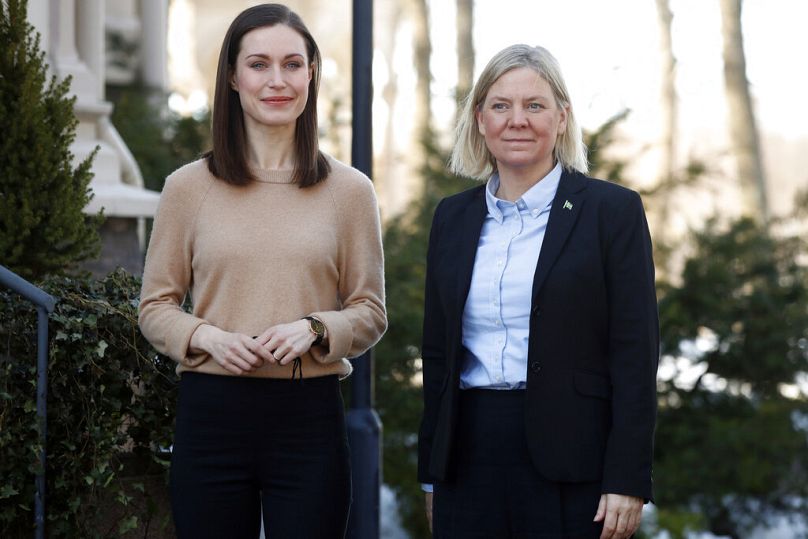
Finnish PM Sanna Marin, left, welcomes Swedish PM Magdalena Andersson in Helsinki, 5th March 2022
Roni Rekomaa/Lehtikuva
Protecting Finland's Russian population
A legacy of Finland's long shared history with Russia, and a product of geography, are the tens of thousands of Russians who make Finland their home, and thousands more Finns who speak Russian as their first language.
There's been a strong message from the country's leaders, and even its security services, on ensuring the safety of those people.
"There is no place in Finland for any kind of violence or vandalism against ordinary people, regardless of where they are or what language they speak," Prime Minister Sanna Marin said at the beginning of March, in between a whirlwind of diplomatic meetings with her counterparts from Sweden and Estonia. Her ministers too have been shuttling around the region for talks with their Nordic and Baltic opposite numbers.
In a rare show of political unity, Finland's parliamentary parties issued a statement of support for people of Russian origin, calling for them not to be discriminated against or harassed "because of the war started by the Kremlin".
"No-one is to blame for the situation in Ukraine simply because of their origin or language," the parties said.
For a country that can often be quite set in its ways in many respects, Finns have seen an unprecedented pace of change when it comes to Russia in the last fortnight.
There is a cost to all this change: whether it's the removal of a Soviet-era peace statue in a Helsinki park; the impact of trade sanctions on so many businesses; Finnair services cancelled because they can't overfly Russia to their main Asian markets; and political and cultural upheaval around security and NATO.
But it seems that so far, Finns are mostly okay with this evolution, with paying this high price.
Or to use another Finnish phrase, they're willing to pay the price of strawberries.
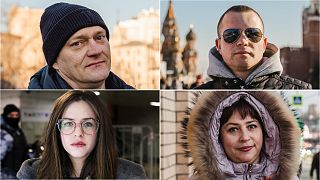

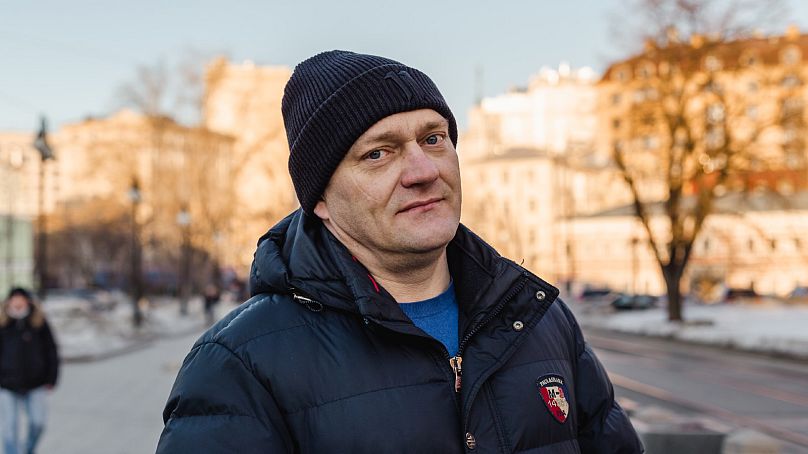
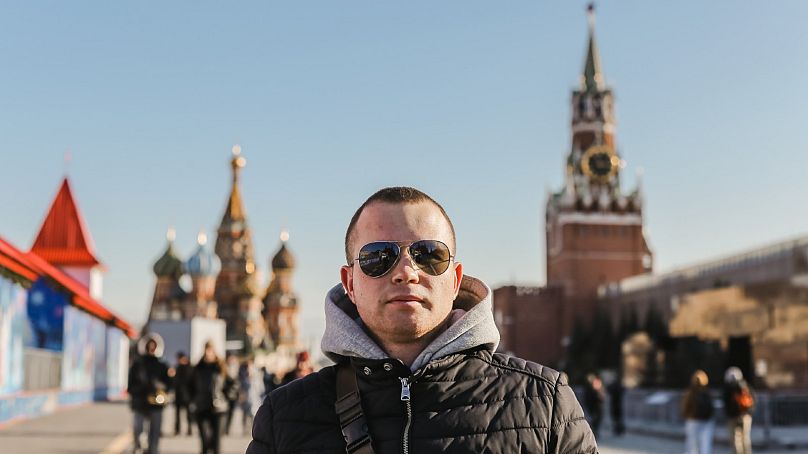
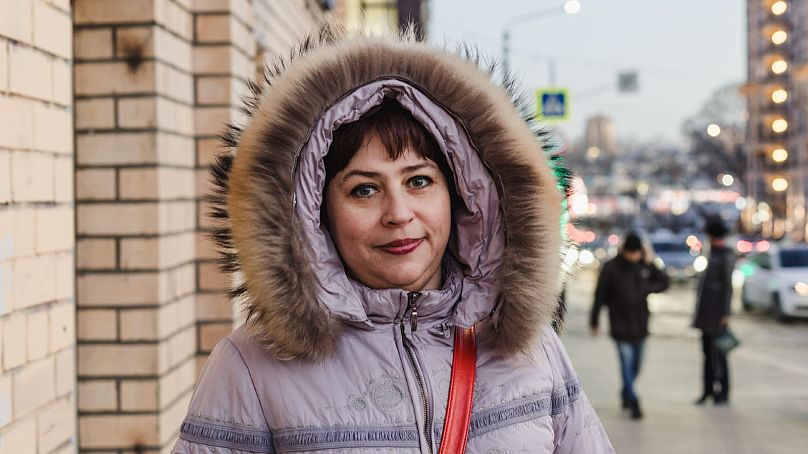
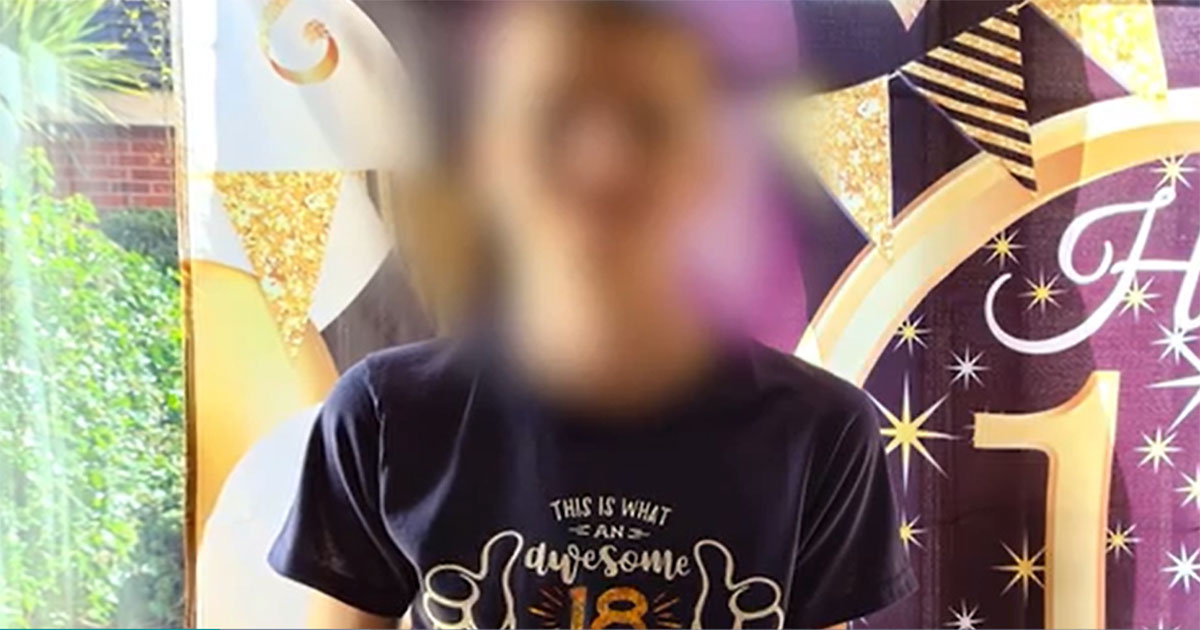
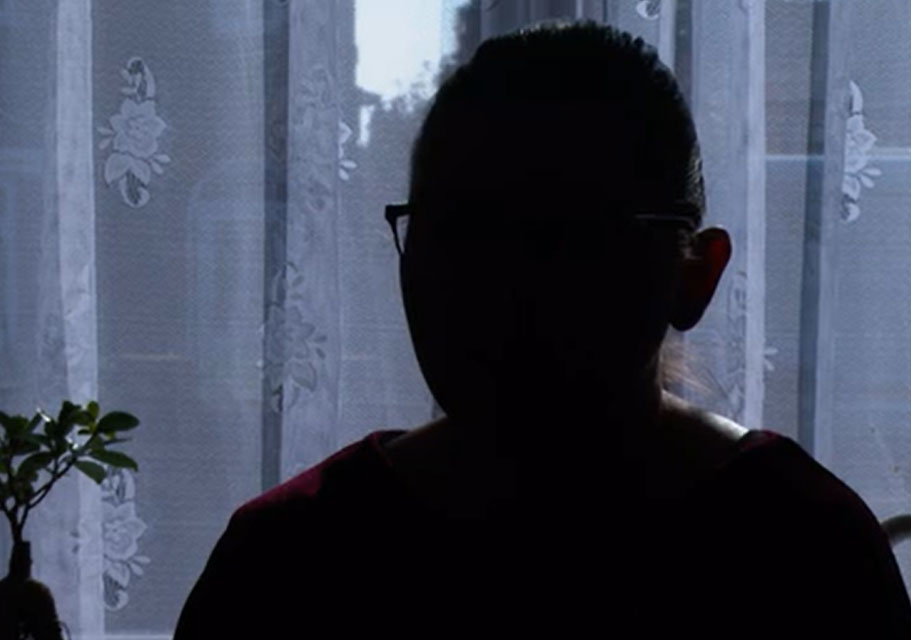














/cdn.vox-cdn.com/uploads/chorus_image/image/70615483/how_putin_falls_secondary_1bv2.0.jpg)
:no_upscale()/cdn.vox-cdn.com/uploads/chorus_asset/file/23306704/how_putin_falls_secondary_2b.jpg)
:no_upscale()/cdn.vox-cdn.com/uploads/chorus_asset/file/23307375/GettyImages_1238728652.jpg)
:no_upscale()/cdn.vox-cdn.com/uploads/chorus_asset/file/23306690/how_putin_falls_board_2c.jpg)
:no_upscale()/cdn.vox-cdn.com/uploads/chorus_asset/file/23307160/GettyImages_470588579.jpg)
:no_upscale()/cdn.vox-cdn.com/uploads/chorus_asset/file/23307061/GettyImages_955002576.jpg)